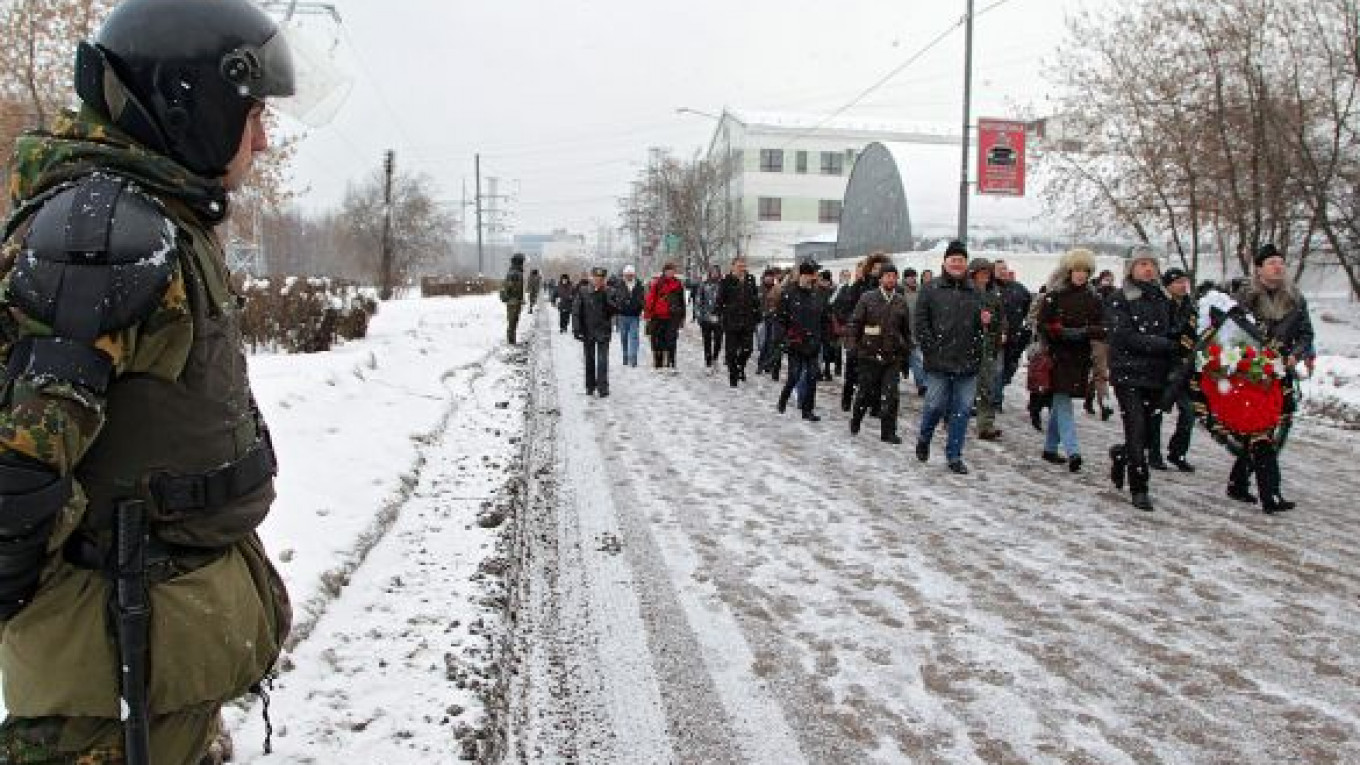Hundreds of young people rallied on Saturday to commemorate a football fan killed last month in an interracial brawl, but despite police fears, the event, organized by Yabloko and attended by nationalist leaders, ended peacefully.
Nevertheless, 19 people were briefly detained by police for a check into whether they had participated in violent Dec. 11 rioting on Manezh Square over the death.
Another 22 people were held after a sanctioned rally in St. Petersburg attended by 250 to 300 participants, Fontanka.ru reported, and 24 were detained at an improvised march in Yaroslavl, Interfax reported.
In Moscow, more than 1,000 people gathered on Kronshtadsky Bulvar in the city's northeast where Yegor Sviridov, a Spartak Moscow fan, was shot dead 40 days earlier in a fight with North Caucasus natives.
Some 4,000 police and Interior Ministry troops kept watch across the city Sunday for possible rioting, Moscow police spokesman Viktor Biryukov said, Gazeta.ru reported. No incidents were reported.
In a rare twist, the rally was organized by the liberal Yabloko party, and its leader, Sergei Mitrokhin, laid flowers at the site of Sviridov's death.
The relationship between liberal politicians and nationalists is strained at best, but Mitrokhin's assistant, Artur Grokhovsky, who carried out the logistics of organizing the rally, told The Moscow Times on Sunday that “the event was organized so that people of all sorts of ideological viewpoints, even radical ones, could attend as long as they respected the law.”
Grokhovsky denied that Yabloko was courting the football fan community for votes in upcoming State Duma elections in December.
Mitrokhin agreed, writing on his Twitter blog after the event, “I'm against Nazis privatizing his [Sviridov's] memory.”
The rally was attended by two ultranationalist leaders, Sergei Belov, head of the Movement Against Illegal Migration, and Dmitry Demushkin, head of the banned Slavic Union. Neither made speeches.
The event ended with some participants singing “Sacred War,” a World War II song about fighting Nazi invaders.
The December rioting prompted fears about a rise of ultranationalism in the country, but participants at Saturday's event said their anger was primarily directed at the police. The investigation into Sviridov's death infuriated football fans and nationalists — two communities that often include the same people — when the police released several North Caucasus suspects. Suspicions flourished that the suspects had bribed the police, and the suspects are now back in custody.
“This case is a good example of what happens when the authorities do not react properly to an outrageous situation," said Maxim, 32, a Spartak fan sporting a scarf with team colors. "Things might turn out much worse."
Maxim, who refused to give his last name for fear of reprisal, condemned attacks on Central Asian migrants after Sviridov's death, saying crime groups, not regular migrant workers, were to blame for increasing ethnic tensions.
“I don't understand why innocent workers from Central Asia were killed," he said. "Ethnic gangs should be taken care of.”
A Message from The Moscow Times:
Dear readers,
We are facing unprecedented challenges. Russia's Prosecutor General's Office has designated The Moscow Times as an "undesirable" organization, criminalizing our work and putting our staff at risk of prosecution. This follows our earlier unjust labeling as a "foreign agent."
These actions are direct attempts to silence independent journalism in Russia. The authorities claim our work "discredits the decisions of the Russian leadership." We see things differently: we strive to provide accurate, unbiased reporting on Russia.
We, the journalists of The Moscow Times, refuse to be silenced. But to continue our work, we need your help.
Your support, no matter how small, makes a world of difference. If you can, please support us monthly starting from just $2. It's quick to set up, and every contribution makes a significant impact.
By supporting The Moscow Times, you're defending open, independent journalism in the face of repression. Thank you for standing with us.
Remind me later.






